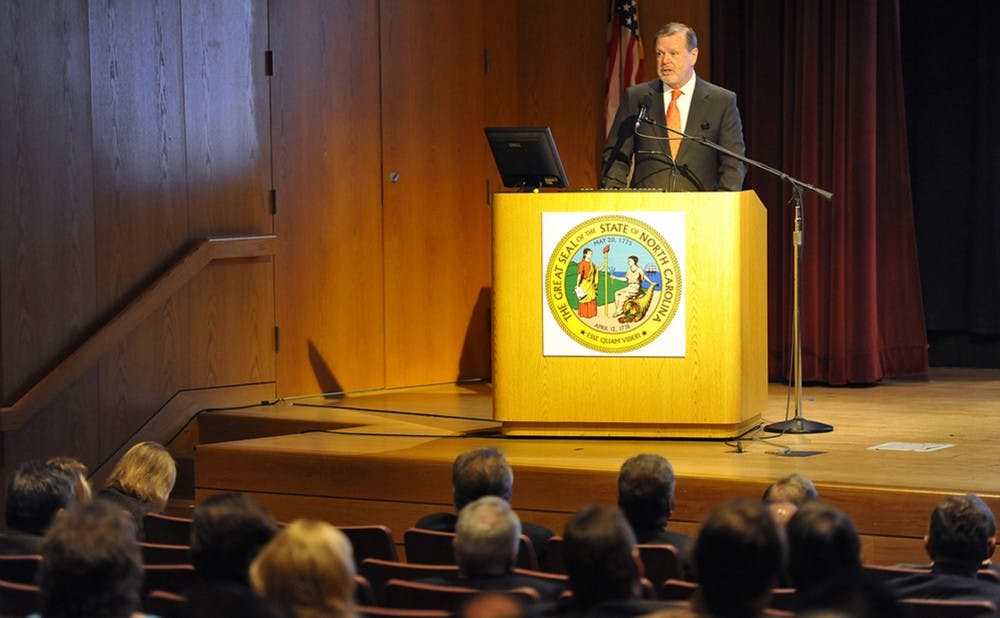Although Amendment One was ruled unconstitutional several weeks ago, Republican state legislators are preparing to challenge the decision.
Republicans in the state legislature have announced their plans to appeal the overturn of Amendment One. Amendment One—the state constitutional ban on same-sex marriage—was lifted on Oct. 10. Although state legislators were granted the ability to challenge the decision several days after the ruling, political observers have noted that a successful appeal is unlikely and that any potential lawsuits will most likely be politically motivated.
"[An appeal] seems very unlikely to make any practical difference," said Neil Siegel, David W. Ichel Professor of law.
Five days after Amendment One was overturned, William Osteen, a federal judge of the U.S. District Court for the Middle District of North Carolina, allowed state legislators to appeal the decision. Speaker of the N.C. House Thom Tillis, the Republican contender in the upcoming U.S. Senate election, and state Senate President Pro Tempore Phil Berger, have announced that they will participate in lawsuits challenging the amendment's repeal.
The ban on Amendment One stems from Bostic v. Schaefer, a court case in Virginia which challenged the state's refusal to sanction gay marriages. Virginia’s ban on gay marriage was struck down as unconstitutional, and the decision was upheld in both U.S. District Court for the Eastern District of Virginia and the Fourth Circuit Court of Appeals. When the Supreme Court denied judicial review for Bostic v. Schaefer Oct. 6, it allowed the court decision to stand, establishing a precedent for all five states which fall under the Fourth Circuit Court of Appeals—including North Carolina.
“The only [appeal] I can think of that isn’t frivolous is that Bostic was wrongly decided and should be overruled,” Siegel said.
A Republican appeal would go to a panel of three Fourth Circuit judges, who are not allowed to overrule the precedent but can make the argument to preserve it, Siegel explained. If the Fourth Circuit panel dismisses the lawsuit, the appellants can request a rehearing before the entire Fourth Circuit bench. Siegel noted, however, that there is "no way" that the Fourth Circuit bench will sit for a rehearing.

After the Fourth Circuit, the Supreme Court is the only court that can overturn the Amendment One ruling. If other appeal courts issue rulings contradicting Bostic v. Schaefer, the Supreme Court will likely get involved to settle the dispute and decide whether or not same-sex marriage bans across the country are constitutional.
"The U.S. Supreme Court will get involved if and when it wants to get involved," Siegel said. "It doesn’t require Amendment One to do that, because it has plenty of opportunities to do that. But for the time being, the Supreme Court is not getting involved and you can’t convince the Fourth Circuit that [Bostic v. Schaefer] was wrongly decided."
Although a successful appeal of the Amendment One overturn is unlikely, Tillis may have political motivations to announce his opposition to the ruling, said John Aldrich, Pfizer-Pratt University professor of political science. Strong opponents of same-sex marriage may be more inclined to vote for Tillis if he announces his support for the lawsuit, he said.
“It’s useful, politically, if you want to satisfy a base,” Siegel added. “I myself don’t see anything being served by an appeal in terms of changing the law. I see it more in terms of achieving a political agenda.”
Chris Hayden, press secretary for incumbent democrat Senator Kay Hagan's campaign, said the Senator supports marriage equality for all and that any potential lawsuit by the legislature concerning Amendment One would be a misuse of taxpayer money.
Attitudes toward same-sex marriage are changing in the country, Siegel noted.
“The politics right now on same-sex marriage are different from what they were when Amendment One was passed,” Siegel said. “I think the state, like the country, is in transition.”
Get The Chronicle straight to your inbox
Signup for our weekly newsletter. Cancel at any time.

